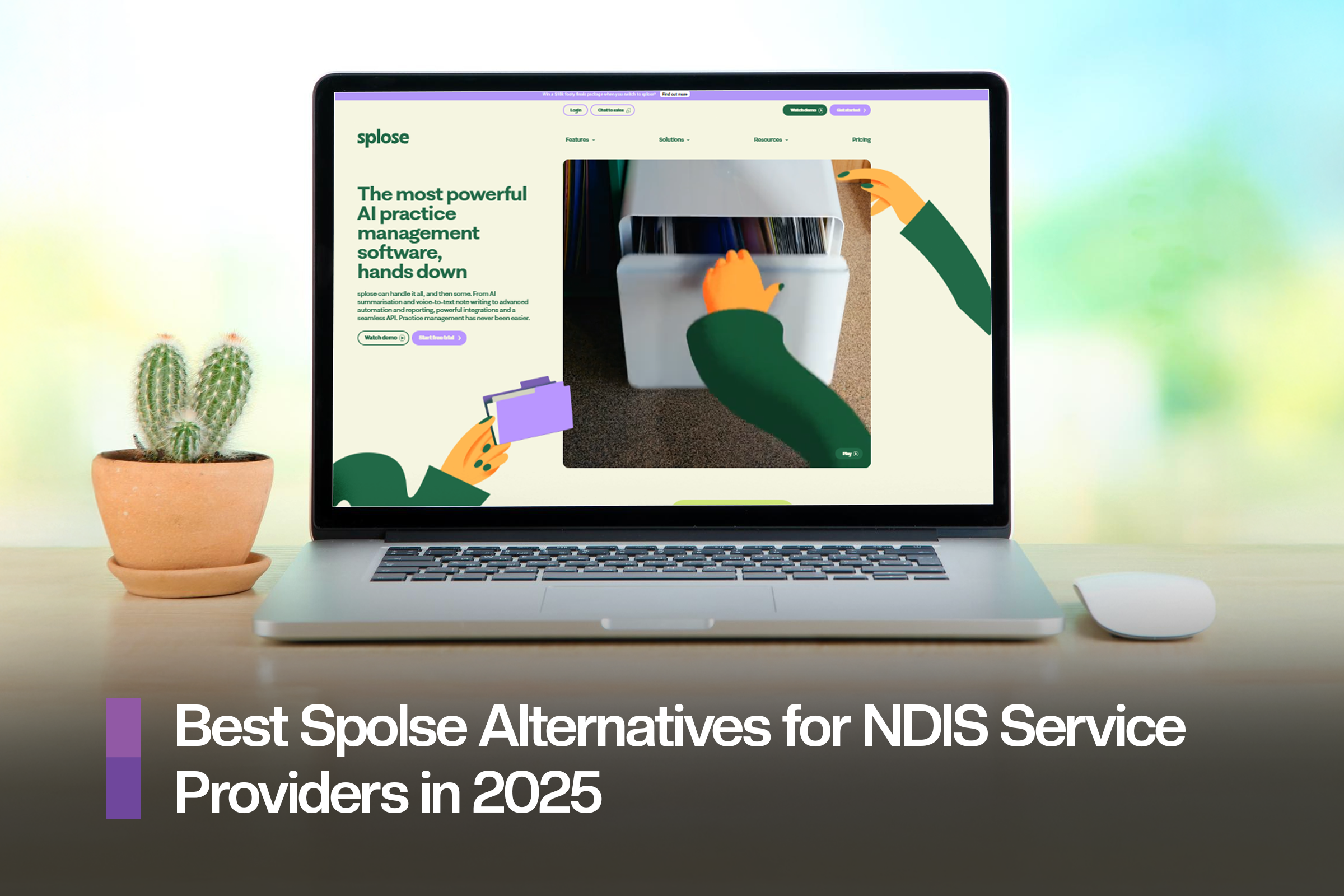NDIS Accounting Guide: Top Tips for Providers to Manage Finances in 2025
Learn the top NDIS accounting tips for 2025 to keep your provider business financially healthy, compliant, and efficient. Discover how imploy simplify invoicing, reporting, and funding management for NDIS providers.

Managing finances as an NDIS provider is no easy task. With shifting funding rules, evolving regulations, and growing compliance demands, having a structured financial approach is essential. In 2025, staying on top of your finances matters more than ever. Whether you’re a small provider starting out or a larger organisation expanding services, these tips will help you stay financially healthy, compliant, and focused on participant outcomes.
The NDIS landscape continues to evolve, with new Pricing Arrangements, stricter audit expectations, and increased digital transparency. This guide outlines practical strategies to strengthen your accounting and finance functions, so you can focus on what you do best: supporting participants.
Advantages of Managing Finances Effectively
Sound financial management doesn’t just keep your business afloat - it drives long-term stability and growth. Here are the key benefits of managing your finances well as an NDIS provider:
- Improved Cash Flow Stability
Effective budgeting and forecasting ensure you can meet payroll, pay suppliers, and cover operational costs even when participant payments are delayed. - Stronger Compliance and Audit Readiness
Accurate financial records and transparent reporting make it easier to meet NDIS Practice Standards, prepare for audits, and demonstrate accountability. - Better Decision-Making
Real-time visibility into income, expenses, and funding utilisation empowers providers to make smarter strategic decisions about staffing, pricing, and expansion. - Enhanced Reputation and Trust
Transparent financial management reassures participants, families, and stakeholders that their funding is being handled responsibly and ethically. - Scalability and Business Growth
When your accounting systems and financial controls are solid, scaling your services or expanding into new regions becomes much smoother and less risky. - Reduced Administrative Burden
Automation in invoicing, payroll, and reporting saves time, reduces manual errors, and allows staff to focus more on client care rather than paperwork.
In short: good financial management means more control, less stress, and a healthier business ready to adapt to industry changes.
Key Accounting Tips for NDIS Providers in 2025
Running a financially sustainable NDIS business requires more than just delivering great support - it also means managing your money strategically. With ongoing price guide updates, compliance obligations, and increasing competition, 2025 is the year for providers to strengthen their accounting practices. These key tips will help you stay compliant, improve efficiency, and build financial resilience across your operations.

1. Stay Up-to-Date with the NDIS Price Guide
Each financial year, the NDIA updates the Pricing Arrangements and Price Limits, introducing changes to hourly rates, service categories, line item codes, and billing rules. These updates directly impact your revenue and compliance.
Failing to align your invoicing and reporting with the latest Price Guide can result in claim rejections, delayed payments, or audit risks.
Action tip:
Download the latest NDIS Price Guide and update your accounting processes accordingly. Ensure all staff - particularly your finance and service delivery teams are briefed on any key changes to billing or reporting.
2. Set Up a Robust Accounting System
A solid accounting foundation keeps your business sustainable. Choose accounting software that lets you track income and expenses by participant, service type, and funding category. Integrating your accounting system with rostering and invoicing tools can eliminate double-handling and improve accuracy.
Whether you use imploy, Xero, or MYOB, make sure your system allows for:
- Automated reconciliation and NDIS claim tracking.
- Secure participant-level reporting.
- Integration with timesheets and payroll.
Tip: Separate your business and personal accounts to maintain transparency and simplify tax reporting.
3. Maintain Detailed Service Records
Accurate, real-time service documentation is essential for compliance and audit readiness. Each service entry should include the date, duration, support type, staff details, and participant outcomes.
Moving to a digital record-keeping system helps ensure data integrity, simplifies NDIS audits, and prevents lost paperwork. Learn more about NDIS Internal Audit on our page.
Tip: Every invoice line item should be backed by corresponding service documentation. This creates a clear evidence trail for NDIA verification.
4. Monitor Cash Flow Carefully
Cash flow management can make or break an NDIS business. Because NDIA payments can sometimes be delayed or disputed, it’s crucial to maintain strong liquidity.
Develop monthly cash flow forecasts and track outstanding invoices regularly. Set aside funds for essential obligations like wages, superannuation, and tax.Tip: Set up automated invoice reminders and integrate your accounting platform with your payment gateway to reduce administrative follow-ups.
5. Budget for Staff and Operational Costs
Staff costs are typically the largest line item for NDIS providers - often representing over 70% of total expenditure. This includes wages, super, leave entitlements, training, and travel allowances.
In addition, providers must plan for insurance, vehicle expenses, technology subscriptions, and ongoing compliance costs.
Tip: Run financial scenarios - growth, no changes, or downturn to understand how changes in participant numbers or wage rates could affect your sustainability.
6. Plan for Tax and Compliance Obligations
Providers must stay on top of registrations and reporting obligations, including ABN, GST, PAYG withholding, and superannuation. If you offer fringe benefits (like staff vehicles or accommodation), you may also need to consider FBT.
Keeping accurate records for Business Activity Statement(BAS) and income tax ensures you meet ATO and NDIA compliance expectations.
Tip: Engage an accountant who understands NDIS and aged care sector regulations. Conduct quarterly reviews so you’re always ready for EOFY reporting.
7. Conduct Regular Financial Reviews
Financial reviews aren’t just about checking numbers, they’re about understanding your business health. Compare actual income and expenses against budgets monthly or quarterly. Track utilisation rates, claim rejections, and margins across service categories.
These insights can help identify underperforming areas, guide staffing adjustments, and support strategic planning.
Collaborate across teams - finance, operations, and support coordination for a holistic view.
8. Leverage Technology for Efficiency
Automation and integration are your allies. Using cloud-based platforms for rostering, timesheets, invoicing, and payroll saves time and reduces manual entry errors. Look for systems that integrate directly with your accounting and claim management software.
Tip: Review your tech stack annually. Are your current systems still the best fit? Could switching to an all-in-one platform like imploy streamline operations and reporting?
9. Stay Compliant and Informed
NDIS compliance evolves regularly - from Practice Standards to billing rules. Appoint a compliance officer responsible for keeping policies, staff training, and procedures up to date.
Regular internal audits and staff refreshers can prevent costly non-compliance issues.
Tip: Stay subscribed to NDIS provider updates and resources such as the NDIS Commission and NDIA news.
How imploy Helps Providers with Accounting?
imploy is designed specifically for NDIS and aged-care providers to streamline accounting, invoicing, claims, and compliance - all in one integrated system. Here’s how it supports you:
Overview:
imploy’s accounting module brings together invoicing, expense tracking, funding breakdowns and audit-ready reporting in one platform. It’s tailored for NDIS environments, reducing double-handling and improving accuracy.
Key Features:
- Automatic Invoicing: Generate invoices directly from completed shifts, including travel claims and service details - no manual data entry tied to shift rosters.
- Bulk Claims Processing: With PRODA integration, you can create claim-ready exports aligned with NDIA guidelines to submit in bulk.
- Participant Statements & Funding Visibility: Provides branded monthly statements for HCP clients, with clear breakdowns of service dates, spend and remaining funds. Also offers live funding/budget visibility and alerts when a client’s funding nears depletion.
- Staff Travel Claim Management: Automates travel claim calculations between clients, filters by travel type, and integrates into invoices seamlessly.
Benefits for Providers:
- Reduces administrative workload and error risk by automating invoicing and travel claims.
- Improves transparency with clients via clear funding and statements.
- Enhances audit-readiness by generating compliant bulk-claim files and detailed reports.
- Offers better financial control through live dashboards and funding monitors.
With all your accounting, invoicing, and compliance tools in one place, imploy helps NDIS and aged-care providers work smarter and stay compliant. It simplifies financial processes, reduces admin time, and gives you real-time control over your business , so you can focus on delivering quality care and growing sustainably.
Final Thoughts
Financial management is the backbone of every successful NDIS business. By staying informed, organised, and tech-enabled, providers can ensure sustainability and deliver exceptional participant outcomes.
Using tools like imploy not only saves time but also gives you the confidence that every financial process - from invoicing to reporting is handled with precision.
Start your journey towards simpler NDIS financial management today at imploy.
Frequently Asked Questions (FAQs)
1. What accounting system is best for NDIS providers?
The best accounting system is one that integrates with your rostering, invoicing, and claims processes. Platforms like imploy, Xero, or MYOB are popular because they support automation, PRODA-compatible reporting, and NDIS-compliant record-keeping.
2. How often should I review my NDIS financial reports?
It’s best practice to conduct monthly or quarterly reviews. This allows you to compare budgets versus actuals, track claim rejections, and identify trends in utilisation rates or cash flow issues early.
3. Why is the NDIS Price Guide important for financial management?
The NDIS Pricing Arrangements and Price Limits determine how much you can charge for each service. Staying aligned with the latest guide ensures accurate billing, prevents claim rejections, and maintains compliance.
4. How can I improve cash flow as an NDIS provider?
You can strengthen cash flow by issuing invoices promptly, setting up automated reminders, reconciling payments weekly, and maintaining a cash reserve to manage NDIA payment delays.
5. What financial documents should I keep for NDIS audits?
Keep service delivery records, invoices, participant agreements, payroll records, and proof of payments. These should match the services claimed under each participant’s funding and be stored securely for at least seven years.
6. How can technology help streamline NDIS accounting?
Using cloud-based software for rostering, timesheets, payroll, and invoicing eliminates manual work, reduces errors, and improves data accuracy. Tools like imploy integrate all these functions to simplify claim management and financial reporting.






